|
Books Should Be Free Loyal Books Free Public Domain Audiobooks & eBook Downloads |
|
|
Books Should Be Free Loyal Books Free Public Domain Audiobooks & eBook Downloads |
|
Religion |
|---|
|
Book type:
Sort by:
View by:
|
By: Palladius ( - c.457) | |
|---|---|
 Lausiac History
Lausiac History
The Lausiac History (Historia Lausiaca) is a seminal work archiving the Desert Fathers (early Christian monks who lived in the Egyptian desert) written in 419-420 by Palladius of Galatia, at the request of Lausus, chamberlain at the court of the Byzantine Emperor Theodosius II. Certainly not all of the Christian monks mentioned in the Lausiac History are recognized as Saints. The influence of Origen on the author, as well as on many of the desert dwellers, is clearly seen in this collection of stories... | |
By: Pansy (1841-1930) | |
|---|---|
 Sunshine Factory
Sunshine Factory
Seven very short sweet stories by Pansy that you will not soon forget! They are stories children will love, and everyone can enjoy. They will make you smile and laugh and bring tears to your eyes. And each one teaches an important lesson in a sweet, encouraging way. | |
By: Reuel Howe (1905-1985) | |
|---|---|
 Herein is Love
Herein is Love
Prescient look at the church, its message and role in society, both perceived and true, focused through the lens of the biblical doctrine of love, and demonstrated in relationships between parent and child, parishioners and public, and pastor and people. | |
By: Rev. James MacCaffrey (1875-1935) | |
|---|---|
 History of the Catholic Church from the Renaissance to the French Revolution: Volume 1
History of the Catholic Church from the Renaissance to the French Revolution: Volume 1
This first volume of a two volume set traces the trials and triumphs of the Catholic Church during the period before the reformation up to the 19th century. The origins, causes and developments of the various protestant sects that were the fruit of the reformation are studied in depth, as well as the men, schools of thought and movements within and without the Church that influenced this important time period in Church history. | |
By: Robert G. Ingersoll (1833-1899) | |
|---|---|
 Ingersoll on ABRAHAM LINCOLN, from the Works of Robert G. Ingersoll, Volume 3, Lecture 3
Ingersoll on ABRAHAM LINCOLN, from the Works of Robert G. Ingersoll, Volume 3, Lecture 3
Col. Ingersoll begins his popular lecture series on famous persons as follows: "It is hard to overstate the debt we owe to the men and women of genius. Take from our world what they have given, and all the niches would be empty, all the walls naked—meaning and connection would fall from words of poetry and fiction, music would go back to common air, and all the forms of subtle and enchanting Art would lose proportion and become the unmeaning waste and shattered spoil of thoughtless Chance." One... | |
 Mistakes of Moses
Mistakes of Moses
Robert G. Ingersoll was an extremely popular humanist orator in the late nineteenth century, and he wrote Mistakes of Moses after many bootlegged versions of his speeches had been published and circulated. In Mistakes of Moses, through a close, literal reading of the Pentateuch, he challenges biblical stories using science, logic and morality. | |
By: Saint Ambrose | |
|---|---|
 Concerning Virgins (version 2)
Concerning Virgins (version 2)
The value of this work is not limited to virgins. For although the author, Saint Ambrose of Milan, wrote this for his sister, the nun, Saint Marcellina, my hope is that this recording will prove edifying to all who desire to serve the Lord Jesus Christ in chastity. | |
 On Virginity (De Virginitate)
On Virginity (De Virginitate)
One favorite topic of his was the excellence of virginity, and so successful was he in persuading maidens to adopt the religious profession that many a mother refused to permit her daughters to listen to his words. The saint was forced to refute the charge that he was depopulating the empire, by quaintly appealing to the young men as to whether any of them experienced any difficulty in finding wives. He contends, and the experience of ages sustains his contention that the population increases in direct proportion to the esteem in which virginity is held. . St. Ambrose. Catholic Encyclopedia. New York: Robert Appleton Company.) | |
 On the Death of Satyrus and On the Belief in the Resurrection
On the Death of Satyrus and On the Belief in the Resurrection
Two related addresses occasioned by the unexpected death of Ambrose's brother Satyrus: On the Death of a Brother and On the Belief in the Resurrection. - Summary by InTheDesert | |
By: Saint Bernard of Clairvaux (1090-1153) | |
|---|---|
 Concerning Grace and Free Will
Concerning Grace and Free Will
The subject of the treatise was suggested, as is plain from the text itself, as the result of a public, or at any rate semi-public, discussion with some person unknown in which St. Bernard, strongly commending the work of grace, had seemed to lay himself open to the charge of unduly minimizing the function of free will. There is about the treatise the fragrance of mystical theology; not the mystical theology of the esoteric, but that of the simple Christian living in the world. It is wonderful how this ascetic, this cloistered recluse, touches his subject with the hand of one who knows the pulsations of average humanity. | |
 On Loving God
On Loving God
"You want me to tell you why God is to be loved and how much.I answer, the reason for loving God is God Himself; and the measure of love due to Him is immeasurable love. . . ." Saint Bernard's On Loving God is one of his most delightful, and most widely read, works. It stands in the tradition of the Fathers of the Church, but it carries patristic teaching into the Middle Ages and into the cloister. Its famous affirmation that God is to be loved without limit, sine modo, is taken directly from the letters of Saint Augustine... | |
By: Shantideva (8th Cent.-8th Cent.) | |
|---|---|
 Path of Light - The Bodhi-Charyavatara of Santi-Deva
Path of Light - The Bodhi-Charyavatara of Santi-Deva
Shantideva is particularly renowned as the author of the Bodhicaryavatara (sometimes also called the Bodhisattvacaryavatara). An English translation of the Sanskrit version of the Bodhicaryavatara is available online, as well as in print in a variety of translations, sometimes glossed as "A Guide to the Bodhisattva's Way Of Life" or "Entering the Path of Enlightenment." It is a long poem describing the process of enlightenment from the first thought to full buddhahood and is still studied by Mahayana and Vajrayana Buddhists today... | |
By: Thomas Watson (1620-1686) | |
|---|---|
 Divine Cordial (All Things for Good)
Divine Cordial (All Things for Good)
This book is an exposition of Romans 8:28: "We know that all things work together for good to them that love God, to them who are the called according to his purpose." It was written in 1663, one year after Thomas Watson and many other Puritan ministers were forced out of their pulpits by the Act of Uniformity. Watson's book radiates comfort in the midst of suffering. Its content is equally applicable to Christians facing trials today. (Introduction by rosea) | |
 Art of Divine Contentment
Art of Divine Contentment
"The Art of Divine Contentment" is an exposition by the Puritan minister Thomas Watson of the text found in Philippians 4:11: "I have learned, in whatsoever state I am, therewith to be content." It examines the nature of contentment and how to live it out in the Christian life, both by answering questions regarding problems with contentment and by giving examples of practical contentment. It is a good read for people with religious or historical interests. | |
By: Various | |
|---|---|
 King's Daughter and Other Stories for Girls
King's Daughter and Other Stories for Girls
A charming collection of short stories for young girls, including The King's Daughter, The Old Brown House, A Story for School Girls, What One Lie Did, Two Ways of Reading the Bible, Courtesy to Strangers, Live for Something, and Jennie Browning. Each story subtly teaches an important lesson. | |
 Forbidden Gospels and Epistles
Forbidden Gospels and Epistles
This is a compilation of ancient books attributed to the writings of the apostles of Jesus Christ and their disciples. These books were once regarded with reverence by the early Christian Church during the first four centuries. After violent disputations by the Bishops of the Nicene Council, these books were forbidden and omitted from the Catholic and Protestant Editions of the New Testament in the reign of the Emperor Constantine. The "Forbidden Books" have been translated from the original tongues, with historical references to their authenticity, BY ARCHBISHOP WAKE AND OTHER LEARNED DIVINES. | |
 Selections from The Army and Navy Hymnal, Volume 2
Selections from The Army and Navy Hymnal, Volume 2
This collection was a joint effort by the chaplains of the US Army and the Navy to meet the needs of divine services conducted in the Army and Navy, and for, in the compilers' words, "the upbuilding of patriotic citizenship." These 20 hymns from the book were selected by the singers. | |
 Selections from The Army and Navy Hymnal, Volume 1
Selections from The Army and Navy Hymnal, Volume 1
This collection was a joint effort by the chaplains of the US Army and the Navy to meet the needs of divine services conducted in the Army and Navy, and for, in the compilers' words, "the upbuilding up patriotic citizenship." These 20 hymns from the book were selected by the singers. "Fairest Lord Jesus" sung by Kimberly Krause and TriciaG "Safe in the Arms of Jesus" sung by by Dulcimergirl and Kimberly Krause | |
By: Weymouth New Testament | |
|---|---|
 Bible (WNT) NT 08: 2 Corinthians
Bible (WNT) NT 08: 2 Corinthians
This second letter from the Apostle Paul to the congregation of believers in the bustling port city of Corinth gives us a much more personal understanding of Paul's apostleship. He defends it rigorously, convincing his followers of his authority from God and his rights under that authority. His appeals to patience and understanding display a great emotional vulnerability in the seasoned preacher and missionary. He discusses the need to support the congregation in Jerusalem with their gifts, and reaffirms and vindicates his position as apostle to the Gentiles. | |
By: Young's Literal Translation | |
|---|---|
 Bible (YLT) 22: Song of Solomon
Bible (YLT) 22: Song of Solomon
The Song of Songs, also known as the Song of Solomon, the Canticle of Canticles, or simply Canticles, is one of the books of the Ketuvim (the "Writings", the last section of the Hebrew Bible), and the fifth of the "wisdom" books of the Christian Old Testament. Scripturally, the Song of Songs is unique in that it makes no reference to "Law" or "Covenant", nor does it teach or explore "wisdom" in the manner of Proverbs or Ecclesiastes. Instead, it celebrates sexual love. It gives "the voices of two lovers, praising each other, yearning for each other, proffering invitations to enjoy"... | |
 Bible (YLT) 17: Esther
Bible (YLT) 17: Esther
Esther (/ˈɛstər/; Hebrew: אֶסְתֵּר, Modern Ester, Tiberian ʼEstēr), born Hadassah, is the eponymous heroine of the Book of Esther. According to the Hebrew Bible, Esther was a Jewish queen of the Persian king Ahasuerus. Ahasuerus is traditionally identified with Xerxes I during the time of the Achaemenid empire. Her story is the basis for the celebration of Purim in Jewish tradition. | |
By: 'Abdu’l-Bahá ‘Abbás (1844-1921) | |
|---|---|
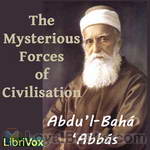 The Mysterious Forces of Civilization
The Mysterious Forces of Civilization
The Mysterious Forces of Civilization (Persian: Risálih-i-Madaníyyih) is a work written before 1875 by ‘Abbás Effendí, known as ‘Abdu’l-Bahá (the Servant of Bahá) (1844-1921). The Persian text was first lithographed in Bombay in 1882 and printed in Cairo in 1911. ‘Abdu’l-Bahá was the eldest son and appointed successor of Bahá’u’lláh, the Founder of the Bahá’í Faith. The original text of this work was written and published anonymously, and the first English translation (by Johanna Dawud) was published in London in 1910 and Chicago in 1918, under the title ‘Mysterious Forces of Civilization’ written by "an Eminent Bahai Philosopher... | |
By: A Sister of Notre Dame | |
|---|---|
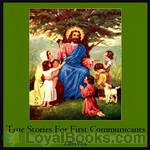 True Stories for First Communicants
True Stories for First Communicants
A charming collection of 12 true, simple stories of real life little boys and girls, written for little ones preparing for their First Holy Communion. | |
By: A. A. (Arthur Aston) Luce (1882-1977) | |
|---|---|
 Monophysitism Past and Present A Study in Christology
Monophysitism Past and Present A Study in Christology
| |
By: A. B. (Albert B.) Simpson (1843-1919) | |
|---|---|
 Days of Heaven Upon Earth
Days of Heaven Upon Earth
| |
By: A. B. (Anders Björn) Drachmann (1860-1935) | |
|---|---|
 Atheism in Pagan Antiquity
Atheism in Pagan Antiquity
| |
By: A. J. (Adoniram Judson) Gordon (1836-1895) | |
|---|---|
 The Ministry of the Spirit
The Ministry of the Spirit
| |
By: A. J. (Augustine J.) O'Reilly | |
|---|---|
 Alvira, the Heroine of Vesuvius
Alvira, the Heroine of Vesuvius
| |
By: A. Medium | |
|---|---|
 Revelations of a Spirit Medium
Revelations of a Spirit Medium
Written anonymously by "a working 'medium' for the past twenty years", this little book was an inspiration for a young Harry Houdini, and also rather hard to find until a facsimile edition was published in 1922, due to all the copies being bought and destroyed by spiritualists. According to the preface, "the most wonderful of the 'medium's' phenomena will be so thoroughly explained and so completely dissected that, after reading this book, you can perform the feats yourself". - Summary by Jordan | |
By: Aaron Merritt Hills (1848-1935) | |
|---|---|
 Life of Charles G. Finney
Life of Charles G. Finney
A.M. Hills, theologian and preacher in the Wesleyan holiness tradition, gives us a detailed biography of Charles G. Finney, one of the most influential revivalists of the nineteenth century. Charles G. Finney was a key figure in initiating the Second Great Awakening in the United States. His preaching was passionate an powerful and his very presence would often bring conviction on those around him. Although his background was Baptist and Presbyterian, he vigorously promoted the doctrine of entire sanctification and the infilling of the Holy Spirit. Finney also left his mark on education as president of Oberlin College in Ohio. - Summary by Larry Wilson | |
By: Abdu’l-Bahá ‘Abbás (1844-1921) | |
|---|---|
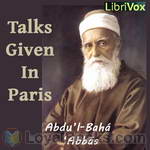 Talks by Abdul Baha Given in Paris
Talks by Abdul Baha Given in Paris
“Much has already been written of the visit of Abdul Baha, Abbas Effendi, to Europe,” writes Lady Blomfield in her Preface to Paris Talks, “During his stay at Paris at 4, Avenue de Comoens, he gave short “Talks” each morning to those who crowded, eager to hear His Teaching. These listeners were of many Nationalities and types of thought, learned and unlearned, members of various religious sects, Theosophists and Agnostics, Materialists and Spiritualists, etc., etc. Abdul Baha spoke in Persian, which was translated into French... | |
 Promulgation of Universal Peace: Vol. I
Promulgation of Universal Peace: Vol. I
“Two years before the crash of world war shook the continents and upheaved oceans,” Howard MacNutt relates. “‘Abdu’l-Bahá ‘Abbás visited the United States of America proclaiming the Glad-Tidings of Universal Peace and the oneness of the world of humanity. In his message he reviewed social, religious and political conditions of the nations, foretold clearly the impending clash and conflict of militarism, summoning mankind to the standard of divine guidance upraised in this cycle of the cycles by the manifestation and teachings of Bahá’u’lláh... | |
 Some Answered Questions
Some Answered Questions
Some Answered Questions was first published in 1908. It contains questions asked to `Abdu'l-Bahá by Laura Clifford Barney, during several of her visits to Haifa between 1904 and 1906, and `Abdu'l-Bahá's answers to these questions. Prominent among the topics are detailed explanations of Christian subjects, including interpretations of chapters 11 and 12 of the Book of Revelation, chapter 11 of the Book of Isaiah, the story of Genesis, and many other subjects. Topics covered include God, Prophets of God, Christian subjects, evolution, the soul, immortality, fate, free will, healing, the non-existence of evil, and reincarnation. (Introduction derived from Wikipedia) | |
 Traveller’s Narrative Written to Illustrate the Episode of the Báb
Traveller’s Narrative Written to Illustrate the Episode of the Báb
“This book is the history of a proscribed and persecuted sect written by one of themselves,” writes Professor Edward Granville Browne, the Cambridge Orientalist who translated this narrative. “After suffering in silence for nigh upon half a century, they at length find voice to tell their tale and offer their apology. Of this voice I am the interpreter.” This work is the story of the life of the Siyyid ‘Alí-Muhammad-i-Shírází (1819-1850), known as the “Báb”, which is Arabic for “Gate”... | |
 Mysterious Forces of Civilization
Mysterious Forces of Civilization
The Mysterious Forces of Civilization (Persian: Risálih-i-Madaníyyih) is a work written before 1875 by ‘Abbás Effendí, known as ‘Abdu’l-Bahá (the Servant of Bahá) (1844-1921). The Persian text was first lithographed in Bombay in 1882 and printed in Cairo in 1911. ‘Abdu’l-Bahá was the eldest son and appointed successor of Bahá’u’lláh, the Founder of the Bahá’í Faith. The original text of this work was written and published anonymously, and the first English translation (by Johanna Dawud) was published in London in 1910 and Chicago in 1918, under the title ‘Mysterious Forces of Civilization’ written by "an Eminent Bahai Philosopher... | |
 Talks by Abdul Baha Given in Paris
Talks by Abdul Baha Given in Paris
“Much has already been written of the visit of Abdul Baha, Abbas Effendi, to Europe,” writes Lady Blomfield in her Preface to Paris Talks, “During his stay at Paris at 4, Avenue de Comoens, he gave short “Talks” each morning to those who crowded, eager to hear His Teaching. These listeners were of many Nationalities and types of thought, learned and unlearned, members of various religious sects, Theosophists and Agnostics, Materialists and Spiritualists, etc., etc. Abdul Baha spoke in Persian, which was translated into French... | |
By: Abū Ḥāmid Muḥammad ibn Muḥammad al-Ghazālī (1058-1111) | |
|---|---|
 Confessions of al-Ghazali
Confessions of al-Ghazali
Abu Hamid al-Ghazali was born in 1058 AD in the city of Tus in modern day Iran. He was a reputed scholar, philosopher and Shafi'i jurist who was a professor of theology at the Nizamiyya College of Baghdad. At the peak of his fame, he was gripped by an internal schism between his beliefs and his inner self. He gave up his position lead a life of seclusion and personal mystical transformation. During this time of solitude and contemplation he authored a number of seminal works reconciling the outward practices of Islam with a deep inner spirituality... | |
By: Adam S. (Adam Samuel) Bennion (1886-1958) | |
|---|---|
 Principles of Teaching
Principles of Teaching
| |
By: Adam Storey Farrar (1826-1905) | |
|---|---|
 History of Free Thought in Reference to The Christian Religion
History of Free Thought in Reference to The Christian Religion
| |
By: Adelaide L. (Adelaide Lisetta) Fries (1871-1949) | |
|---|---|
 The Moravians in Georgia, 1735-1740
The Moravians in Georgia, 1735-1740
| |
By: Adin Ballou (1803-1890) | |
|---|---|
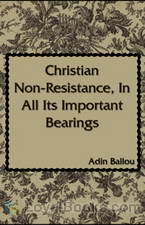 Christian Non-Resistance, In All Its Important Bearings
Christian Non-Resistance, In All Its Important Bearings
In this short book, Ballou defends the notion that non-resistance (today we call it non-violence) is the superior Christian method, and the one practiced by Jesus himself. | |
By: Adolf von Harnack (1851-1930) | |
|---|---|
 History of Dogma, Volume 1
History of Dogma, Volume 1
| |
By: Adolphus Ward (1837-1924) | |
|---|---|
 Counter-Reformation
Counter-Reformation
The Counter-Reformation, also called the Catholic Reformation, and remembered for its infamous Inquisition, was the period of Catholic resurgence which was initiated in response to the Protestant Reformation. Adolphus Ward writes, that it was "a movement pursuing two objects...the regeneration of the Church of Rome, and the recovery of the losses inflicted upon her by the early successes of Protestantism...The onset of the combat is marked by the formal establishment of the Jesuit Order as a militant... | |
By: Adrien Sylvain (1826-1914) | |
|---|---|
 Gold Dust A Collection of Golden Counsels for the Sanctification of Daily Life
Gold Dust A Collection of Golden Counsels for the Sanctification of Daily Life
| |
By: Agnes Maule Machar (1837-1927) | |
|---|---|
 Lucy Raymond Or, The Children's Watchword
Lucy Raymond Or, The Children's Watchword
| |
By: Ahikar | |
|---|---|
 Story of Ahikar
Story of Ahikar
The Story of Ahikar is a fictional work. It is a colorful story but considered to be a work containing great wisdom. The story of Ahikar is considered one of the earliest "international books". It can be found in a variety of geographical translations and has been circulated in the middle east and near east regions. - Summary by CJ Plogue | |
By: Ahmed Hussain (1863-) | |
|---|---|
 Notes on Islam
Notes on Islam
| |
By: Aiden Wilson Tozer (1897-1963) | |
|---|---|
 The Pursuit of God
The Pursuit of God
"As the heart panteth after the water brooks, so panteth my soul after thee, O God." This thirst for an intimate relationship with God, claims A.W. Tozer, is not for a select few, but should be the experience of every follower of Christ. But, he asserts, it is all too rare when believers have become conditioned by tradition to accept standards of mediocrity, and the church struggles with formality and worldliness. Using examples from Scripture and from the lives of saints who lived with this thirst for God, Tozer sheds light on the path to a closer walk with God. | |
By: Alban Butler (1711-1773) | |
|---|---|
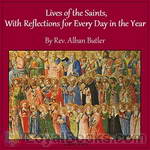 Lives of the Saints, With Reflections for Every Day in the Year
Lives of the Saints, With Reflections for Every Day in the Year
Compiled from the much larger 12 book set of "Butler's Lives of the Saints", this volume contains short biographies of the Saints, for each day of the year, followed by a reflection for each entry. | |
 The Lives of the Fathers, Martyrs, and Principal Saints January, February, March
The Lives of the Fathers, Martyrs, and Principal Saints January, February, March
| |
By: Alban Goodier, S.J. (1869-1939) | |
|---|---|
 Meaning of Life and Other Essays
Meaning of Life and Other Essays
Even with the best intentions, we can often get caught up in the affairs of this world and forget about God. To stay on the path to Heaven we must make, from time to time, an examination of our life's heading. This collection of essays reminds us to live for God rather than for ourselves, encourages us to rise above the concerns and cares of our daily life, and places God's existence - rather than possessions or success - as the true meaning of our lives. . . . While he was the superior of the young Jesuits at Manresa House, Roehampton, Rev... | |
By: Albert Schweitzer (1875-1965) | |
|---|---|
 The Quest of the Historical Jesus
The Quest of the Historical Jesus
In this book, Schweitzer traces the historical progress of 'Historical Jesus' research, from Hermann Reimarus in the mid 18th century, to William Wrede at the turn of the 20th. Schweitzer showed how Jesus' image had changed with the times and with the personal proclivities of the various authors. He concluded with his own synopsis and interpretation of what had been learned over the course of the previous century. He took the position that the life of Jesus must be interpreted in the light of Jesus' own convictions, which he characterized as those of late Jewish eschatology. (Introduction from Wikipedia, modified by JoeD) | |
By: Albert Taylor Bledsoe (1809-1877) | |
|---|---|
 A Theodicy, or, Vindication of the Divine Glory
A Theodicy, or, Vindication of the Divine Glory
| |
By: Albertus Magnus (1193-1280) | |
|---|---|
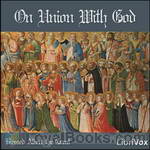 On Union With God
On Union With God
Surely the most deeply-rooted need of the human soul, its purest aspiration, is for the closest possible union with God. As one turns over the pages of this little work, written by Blessed Albert the Great towards the end of his life, when that great soul had ripened and matured, one feels that here indeed is the ideal of one's hopes. (From the Preface) | |
By: Aleister Crowley (1875-1947) | |
|---|---|
 Book of Lies
Book of Lies
The Book of Lies, or Liber 333, is a holy book in the Western occult tradition of Thelema, consisting of 91 short chapters of poems, aphorisms, rituals, and metaphysics. This recording is of the original 1913 publication, and thus omits the further commentaries added by Crowley for subsequent additions. Those familiar with Crowley’s hermetic writings will recognize his subversive and playful style. Beneath the layers of symbolism, contradiction, and blasphemy lies a biting critique of the puritanical social, political, and religious values of the author’s generation. | |
By: Alexander F. (Alexander Ferrier) Mitchell (1822-1899) | |
|---|---|
 The Scottish Reformation Its Epochs, Episodes, Leaders, and Distinctive Characteristics
The Scottish Reformation Its Epochs, Episodes, Leaders, and Distinctive Characteristics
| |
By: Alexander J. (Alexander James) McIvor-Tyndall (-1940) | |
|---|---|
 Cosmic Consciousness
Cosmic Consciousness
| |
By: Alexander Maclaren (1826-1910) | |
|---|---|
 The Life of David As Reflected in His Psalms
The Life of David As Reflected in His Psalms
| |
By: Alexander Patterson | |
|---|---|
 Greater Life and Work of Christ
Greater Life and Work of Christ
It will be seen at a glance that this is not a life of Christ in the usual sense. It is not a review of the events of the earthly existence of our Lord. There is a greater life and a larger work of Christ of which his life on earth is but a single chapter. While no apology is needed for any publication of the great theme of the gospel, it may be stated that there is a special reason for such a book as this. The author has examined many works on Christ and lists of hundreds more, and has conferred with competent literary authorities, and has learned of few works, if any, covering this greater life and work of Christ... | |
By: Alexander Pope (1688-1744) | |
|---|---|
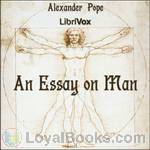 An Essay on Man
An Essay on Man
Pope’s Essay on Man, a masterpiece of concise summary in itself, can fairly be summed up as an optimistic enquiry into mankind’s place in the vast Chain of Being. Each of the poem’s four Epistles takes a different perspective, presenting Man in relation to the universe, as individual, in society and, finally, tracing his prospects for achieving the goal of happiness. In choosing stately rhyming couplets to explore his theme, Pope sometimes becomes obscure through compressing his language overmuch... | |